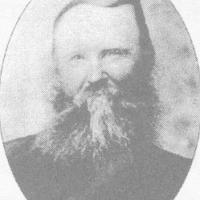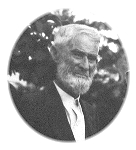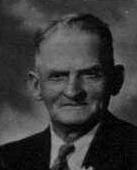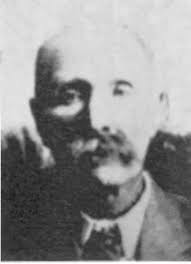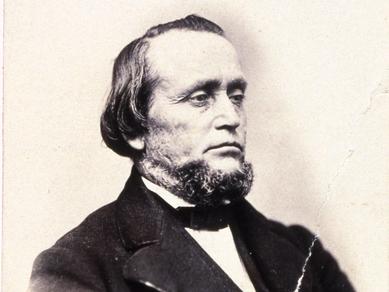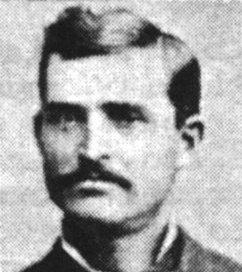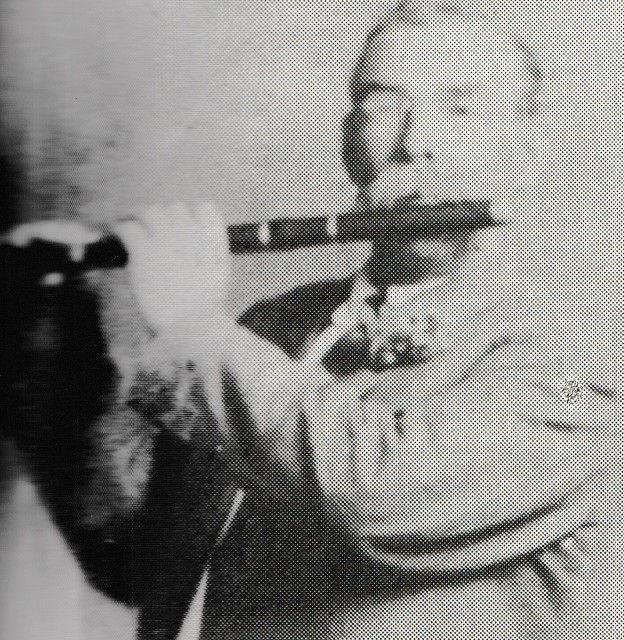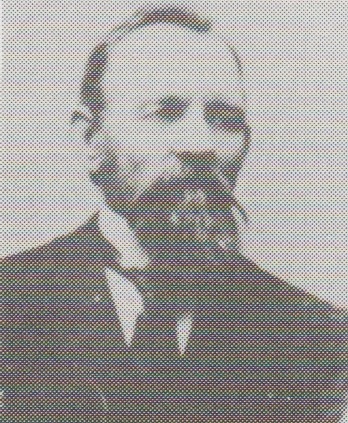Walter Fredrick Hurst
1867-1956
Walter’s father, Philip, was born September 15, 1836. He came to Utah in Captain James. J. Jepson’s Company in 1852 and settled in Springville, Utah.
Philip Hurst married Lucinda Harris Guymon who was born September 9, 1840 in Nauvoo, Illinois. She came to Utah in the Hancock Company and located in Springville, Utah where she and Philip were married. They moved to Fairview later.
To this union were born seven children, including twins, William and Walter. The twins were born June 18, 1967, at Fairview, Utah. The mother, Lucinda, died when they were nine days old. One of the twins, William, who was a strong and healthy looking baby, died when he was two or three months old, leaving Walter, who was a very small and apparently puny baby.
Shortly after Walter’s mother died, his father married Elizabeth Wilcox of Mount Pleasant, Utah. She was very young, not more than 16 or 17 years of age. Even for a woman older and more experienced, it would have been a big undertaking and responsibility to step into a family of five children under conditions of financial insecurity, with a husband away from home so much of the time. Consequently, the young stepmother and the five children had a great many adjustments to make, which led to numerous heartaches and unhappy experiences.
Mr. Orvil Cox of Fairview once told me he remembered calling my father off the street and sewing his big toe on after it had chapped practically off. I asked father in his later years if he remembered anything of this experience. He said he remembered it very well, but that Mr. Cox had confused some of the circumstances. He said that it wasn’t his toe, but his heel. He had gone swimming almost daily and left the water day after day without drying his feet. From getting his feet wet and not wearing shoes his feet became so chapped that a large part of his heel had broken loose. He said he could remember Mr. Cox calling him into the house after examining the heel, making him soak the heel in hot water for a long time, greasing it well, then giving him a bowl of cubed sugar to eat while Mr. Cox sewed the loose heel back on.
When father was about eight years of age he was hit in the eye with a hard snowball. Larger boys were having a snowball fight, and Walter was the victim. His left eye was put out, which was a painful ordeal. Although he could distinguish between light and darkness, the damaged eye greatly handicapped him throughout his life and it finally had to be completely removed. He went to school in the Fairview school, getting no more than a 6th grade education. In spite of his limited schooling, he died a well-educated man. He schooled himself through observation, reading and practical experience.
I have heard Father say that he always pitied every stray dog he came in contact with and how he was always getting in trouble with the family for bringing stray dogs home. Perhaps his great affection for animals was the result of his missing the security of a motherly love at home. He used to say how he longed more than anything else in the world to call someone “Mother,” and how he used to daydream of how his life might have been if he had a mother. He would form mental pictures visible to his mind’s eye and imagine he was talking to her and she to him.
As a young man he became interested in Alzadia Anderson who was the oldest daughter and second child of James Anderson. The Andersons were from Scotland. Having heard the missionaries in their native land, the father, mother, and three sons had joined the Church. In 1855, Alzadia’s grandfather came to America and the following year the three boys and their mother joined him to settle in Utah. The youngest son, James, married Matilda Cheney who gave birth to Alzadia. In the Logan Temple, on April, 20, 1886, Walter Hurst married Alzadia Anderson, who became the best wife and mother anyone could ask for.
Eleven months after their marriage, the first child born to Walter and Alzadia, a five pound baby girl whom they called Eunice Alzadia. Father and mother built a one-room log house which became their first home. It was here that their second child was born, a boy whom they named Walter Lauretz. At this time the house was still not complete. The boy was born on December 27, and I have heard them tell how the snow blew in and covered the bed while mother was bedfast with the new baby. A year and half later Walter and Alzadia, with two small children, went to work on the new railroad that was being built in Pigeon Hollow, between Spring City and Ephraim. They lived in a tent, and while living in such difficult circumstances both children came down with scarlet fever, which was then a much dreaded disease. Because of inadequate medical help and exposure Walter Lauretz died.
The following spring the Hurst family moved to Mexico. Walter’s father was a polygamist, and things were uncomfortable for these people at that time. They were advised to move to Mexico where the government had no laws prohibiting plural marriage. Whether to remain in Fairview with my mother’s people or to move to Mexico with my father’s folks was a hard decision to make, but in April of 1891, Walter and Alzadia left the United States with their only living child to follow Walter’s father, Philip, who along with two wives and his oldest son, had moved to Mexico in January. Grandpa Philip and his wife, Elizabeth Wilcox, had gone first, to be followed later by his second wife, Rebecca, along with Walter’s eldest brother, “young Philip,” who also had two families.
The Hurst families left Walter with the responsibility of chartering railroad cars for the purpose of shipping livestock, machinery, and all kinds of furniture and farm equipment from the states to Mexico. At that time the railroad did not go as far as the Chihuahua colonies. The shipping point was at Deming, New Mexico. There the other members of the Hurst family met Walter and Alzadia to help them transport the livestock and other belongings to where they were colonizing.
When the train stopped in Deming and they climbed from the railroad cars, the wind was blowing so hard their cloths were blown over their heads and they were hardly able to stand on their feet. They were in desert country, and to people who have never been in a windy country it would be hard to describe the conditions that confronted them.
They traveled by team from Deming, New Mexico, to Colonia Dublan in the state of Chihuahua in Mexico. When they reached their destination Walter and Alzadia didn’t have so much as a tent of their own to move into. They had to move into a tent with Walther’s brother and his family. The summer that followed was to Alzadia one of hardship, homesickness, and sacrifice, since she had left all her family and loved ones behind.
Walter bought three or four acres of land his father had purchased, and built a two-room house and barn. He had purchased some oxen and, the following fall, his brother rented and became manager of a sawmill in the mountains where Walter went to work. As nearly as I can find out, the sawmill belonged to the Church and was the responsibility of Moses Thatcher.
The following February, the third child was born. Since their second child had died shortly before they left Utah, this was their second living child, a daughter, whom they named Hannah Lucinda. Now that I have arrived on the scene and can speak for myself, I will write mostly from my own recollections of things that happened after I was four or five years old. I will also call Walter and Alzadia, Father and Mother.
As I reminisce over my life I can remember nothing but hard work, striving honestly and persistently to meet problems and teaching each child that honesty was the most valuable asset one can possess if he were looking for true success. My father had a natural talent for teaching in a way that would leave lasting impressions on a child’s life. My mother was a patient good-natured helpmate. It always seemed to me that she sang or whistled from morning till night regardless of how much poverty she was enduring or what her health condition was.
When I was two months old I was taken to the sawmill and I was there most of the time until I was nine years old. I remember a great many experiences connected with the sawmill history. My parents told me many times how mother would set me in a half-bushel tub when I was a baby. On one particular day, mother was peeling peaches. She gave me a pealed peach. I became restless and she set the tub outside the door with me in it and the peeled peach in my hand. There were four or five other families living on the sawmill at the time, and some of them had pigs running loose. Mother was busy with her work until she heard a frightened cry. Upon looking up she saw the large sow had grabbed me by the wrist while attempting to get the peach. It had tipped over the tub and was still dragging me by the wrist. My uncle George Arthur was just coming around the corner of the bunkhouse and he rescued me before Mother could get to me. I am still carrying the scar from that pig’s teeth.
During the time that Father was sawmilling he sold the land with the two-room house and bought a farm north of town. The land extended west to the river and the top part of it was along the main Street of town. There were a number of buildings on this place, but no house. We lived in a granary while the first brick home in Dublan was being built. We really thought we were rich when we moved into it. This was where Agnes Fern was born on December 1, 1898. As nice as we thought our home was, we still had problems. It was the farthest home north in town and we were in a Mexican district. Mother’s health was very poor and she was afraid to be left alone so much of the time at nights with four little girls. The Mexicans would come from the Corralitos ranch and from the San José district to trade at the Dublan stores. They would gather in groups in front of our home to eat their lunches and drink their tequila. They often became so intoxicated that it worried Mother. I remember how she would lock the doors and not allow us children to step outside. Dad was still sawmilling and was away from home most of the time. Due to Mother’s fear and nervousness, she spent the greater part of her time at the sawmill with Dad. My older sister and I were old enough to go to school but our schooling was interrupted much of the time because we were in the mountains at the sawmill so much.
Consequently, in 1901, Father sold the farm with the new brick house. While he planned to build a nicer home near the center of town where he had purchased the lot, and had the foundation laid, he changed his plans and purchased a large farm four miles from town in the San José district. This was a disappointment to Mother, but inasmuch as we children were old enough to go to school, they realized that the sawmill days would have to come to an end. In Mexico, sawmilling went on the year-round.
The new farm was in a Mexican district and Mother would never make up her mind to live on the farm. She did consent to move into a two-room adobe house in the center of town until the farm was paid for. Paying for the farm, fencing it, and equipping it with machinery and livestock took a long time. It did, however, have a shanty on the back which served as a wash house and utility room.
There was a large river about halfway between the farm and town. When Father was putting up hay, putting in grain or irrigating, he would take a grub box and his bedding and stay three or four days at a time. In the spring or fall when there is a lot of rain in the mountains the river would rise until its banks would overflow a mile or more on either side.
One spring when I was about 10 years of age, Dad went to the farm to sow grain. He was to be gone a couple of days and took my sister Eunice with him. The rain had been quite steady in the mountains and we knew the river was rising. That night Dad and Eunice were supposed to come home, they did not return. Mother and I waited long into the night. We could hear the river roaring, but that was all we knew. I don’t think mother shut her eyes all night. The next morning at sunrise Father rode up to the gate on a strange horse. He was also dressed in strange clothes. As mother saw him she cried out, “Where is Eunice? Is she drowned?” Then Dad explained. He had attempted to cross the river on his way home the evening before. He knew it was high, but did not realize it was nearly as high as it was. He had a team and wagon with a disc, harrow, and other machinery on; he also had several sacks of grain and a plow. As he reached the middle of the river, the horses, wagon, machinery and all were carried away in the stream. He quickly cut the tugs on the harnesses so the horses could be free to swim out. Taking Eunice on his back, he managed to swim to shore, but everything else was carried away in the stream.
There was one American family living on the west side of the river so Eunice went there that night. The family’s name was Carlton. Mrs. Carlton managed to find them some dry clothing that didn’t fit too well, and the next morning Mr. Carlton offered dad his horse which he said was an extra good swimmer. Eunice remained with the Carlton family a few days but Dad swam the river and came home to let us know the conditions, and to get help to find his wagon and machinery.
On April 25, 1902, my sister Lora was added to the family and two years later a brother whose name was James Otis. We had buried a little boy when he was seven months old. I remember how patiently Mother and Dad nursed and cared for the little fellow all through the sickness, of the neighbors and friends came in and administered to his suffering. They worked so hard to save them, but good doctors were not available. He had a large abscess on his throat. It was lanced several times, but infection set in, and he died of blood poisoning I remember how hard Dad cried when they saw he was gone. Mother turned so white and shook, but still kept working with him. This was in May 1905, in the following November, Dad went on a 27 month mission to the southern states.
Dad had always wanted a mission so badly. I think by now he practically had the farm paid for although we were still living in the adobe house. He was afraid if he waited to build, he would never get the mission, and his life would never be complete without it. Mother had just as much faith in the mission as Dad did. Another thing they had so much faith in was the law of tithing. The 10th load of hay, the 10th load grain, the 10th dozen eggs and so on with all their income, they did not consider the 10th was theirs, but was instead taken to the tithing yard or office. Just before Dad left for his mission, his brothers came up and helped him tear the shanty off the adobe house and put on a large kitchen made of rough lumber. Dad thought it would give us much more room, but the lumber shrank and left large cracks and with just a cook stove to keep it warm, and nothing but wood to burn, we almost froze in it.
I didn’t realize at the time Dad left for his mission that Mother was four months along with another baby, but I soon found out. I thought it was so strange that he would go on the 27 month mission with mother in that condition and no help but five little girls. Whenever there was anything said about it, or any of us complained about the way we had to work, Mother would stop and tell us some story about the sacrifices early members of the Church had made to fill missions, and how it took strong faith and regular prayers to keep in tune with their Heavenly Father so we could expect his help.
Eunice, my oldest sister, went to the sawmill to work for dad’s oldest brother, Philip, after Dad left. Mother and I would get up real early in the morning and milk the cows. We would strain the milk and I would harness a horse and hook it up to a one-seated buggy, and take the milk to a railroad junction two miles south of Dublan. There I would deliver one, two, or three quarts to a customer. Then I would have to get back in time for school.
In April 1906, Walden was born. The fact that both my other brothers had died when babies made Walden the only boy in the family. My sister, Eunice, was the backbone of the family when Dad was away, and Mother was sick. It seems she could supply all the needs for the family and be both mother and dad when it was necessary.
By the last December, 1907, Dad’s mission was finished. He came home just in time for Christmas. Walden was past 20 months old. He had long yellow ringlets. Dad came home at night and the next morning he wrapped Walden in a sweater and took him off to find a barber. He wanted those curls cut off so he could realize he had a son.
We prospered beyond words to express during the next three or four years. We were out of debt. Our horses, livestock and other property had increased. Dad worked at the milk business at Nuevo Casas Grandes. A year or two later he worked up a milk business at Pearson where he had sale for our milk and our neighbors’ milk. By 1910 we were considering building a new home. There was one major drawback. The Mexican revolution was doing its worst. The whole country was in an uproar, and everything was unsettled. We didn’t know from one day to another what was going to happen. The papers were full of battle reports. Some of them took place only a few miles from our town. Crops and our accumulations of all kinds were unsafe because there was no government that could protect us. One day the rebels were in power, and within a few days they would be overthrown by the federals. The colonists, or American citizens, were advised to stand neutral and show no sympathy toward either side.
I remember one Sunday afternoon a rebel army marched through our town. They were a pitiful looking group. Some of them were barefoot and their clothes would hardly hang on them. They were headed for old Casas Grandes which was a distance of 12 or 13 miles from our town. At 4:00 a.m. the next morning the battle began and raged until the middle of the afternoon. Hundreds were killed. I remember I was working in the candy shop that day. Most of the places of business in town closed up because people were so upset they could not concentrate. I have often described the noise from that battle as sounding like a community of lumber houses all falling down at the same time.
Conditions went from bad to worse. I remember one day five or six Mexican men came to our house. They said they wanted to come in. There was nothing anyone could do about it. We had no protection as far as the government was concerned. I don’t know what they wanted that day, but they searched through the house and left. There was money in three different places in the house. One box of money belonged to the Dublan Sunday School, as my sister Lillian was the secretary and treasurer of that organization. Dad had a purse another place that the priesthood had delegated him to collect for the purpose of remodeling a widow’s home. We also had the proceeds from the milk sales of the previous week. It seemed they were not supposed to find any of that cash.
A few days after this, I was at my Uncle Jim Young’s home. I happen to be out on the porch and saw Uncle Jim coming from the farm on a large pinto horse which was his pride and joy. He was surrounded by five Mexican men. They all had guns pointed at his head. They told him they wanted his horse, but he wasn’t so sure they were going to get it. When he reached his gate he jumped from his horse still holding it by the reins. He was as white as a dead man. He then turned loose with all the bad phrases that could be uttered; I believe he used all the bad words that I ever heard and a lot more. He told them he was an American citizen and if they didn’t want trouble with the American government they better lay clear of him and his property. This must have frightened them because they turned and fled.
Things went on this way until July 1912. The colonists were ordered by the Mexican Government to turn in all their firearms and weapons of all kinds. The Stake priesthood authorities called meetings in all Wards and advised the Mormon people to turn in no more than one firearm from each home. Some homes had several, and some didn’t have any.
By July 27, the colonists could see that they were in grave danger. The Church and the U.S. Government came to the rescue. Word was circulated that there would be railroad cars in from the states to evacuate the colonists. They would be ready to leave by Sunday evening, July 28.
Dublan, our hometown, was the only colony that the railroad went through, and was the first one to be evacuated. All night Saturday all day Sunday we work to get things ready to leave the best way we could. In our family there were 10. We were allowed to take two mattresses and our best quilts, pillows, and our best clothing. We opened our chicken coops, our pig pens, turned our livestock, turned loose our horses, and at 9:30 p.m. we walked out of our home, never again to return. Part of our crops were harvested, our granaries were full, and we left large stacks of hay. We had bottled quite a bit of fruit that summer which we buried under the floors.
The whole town was at the station at 10:00 p.m. We stood right there and waited until 6:00 a.m. the following morning. When the train did, it wasn’t nearly large enough to hold all the people. It was decided that the women and children under 17 years of age should leave, with barely enough men to take care of them. The remainder of the men were left.
No sooner had the train pulled out than a mob of Mexicans came into the town. The men grabbed horses and the firearms and fled the hills with the Mexicans firing on them. The Mexicans discovered they had guns and could shoot back, they were very much surprised. The Mormons found a place in the hills where they could march around the hill and make it look like there were a great many more of them than there really were.
They fled to the mountains between Colonia Dublan and Colonia Juarez. Here they felt quite safe because they were located where they could ward off quite a large army. Many privations were experience to the fact that they didn’t have time to gather food or clothing, or bedding of any kind to take with them. Someone did take a sack of flour, however, and I have heard Father tell how they stirred flour and water together to make hotcakes, and cooked them on a piece of tin over the campfire. It was two weeks before they were able to get across the border to El Paso, Texas, where they joined their families.
In the meantime the women and children that left on the train at 6:00 a.m. the morning of July 29, 1912, landed in El Paso, Texas, the same afternoon. I remember how worn out we were as we hadn’t slept since the Friday night before and this was Monday. We were transported to a large lumber yard east of town by means of automobiles. Automobiles were new then and there was only one in our hometown when we left, and when we reach Fairview, Utah there was just one there. It belonged to Pat and Jess Young.
When we reached the lumber yard in El Paso, Texas, we were given a small division, like a stall for a horse. It was large enough that we could lay our two mattresses down, but there wasn’t room to walk around or between them. We just sat on them. Our food was delivered by the government and consisted mostly of bread, milk, prepared cereals and canned foods. There were dozens of men working in the lumber yard, dividing it into small sections and putting a roof on it to protect us from the rain. We were so worn out we lay on her mattresses and slept all afternoon the first day while Texas men sawed and hammered over our overheads. We lived in these conditions about 10 days. Then we were transported south of the city to on tenant house where each family was given a small room. They wanted to make room in the lumber yard for other colonists on their way from Mexico.
Believe me, refugees were curiosities to the Texas people. News reporters and cameramen were on the job making the most of everything. When we moved in, we had a chance to cook in a campfire out in front of the building. Each day two or three persons would cook dinner for the whole group that were in the building. We cooked potatoes in a six-gallon lard can and it seemed so good to have hot food.
About August 19, the men arrived from Mexico. How glad we were to see them, and what an experience they had been through. Poor Dad looked so pitiful and worn out. They hadn’t as much as shaved or changed clothes in all this time. Dad didn’t have a saddle on his horse most of the way. Cleveland LeBaron, who at the time was my sister Lillian’s boyfriend, insisted that Dad take his saddle part of the trip.
It was four weeks since we left our home and conditions were no better. Affair steadily grew worse and the refugees were advised by the U.S. government to find locations in the states as rapidly as possible. About the time we received a letter from mothers folks in Fairview, Utah, saying we should take advantage of this opportunity to make a trip to Utah until the trouble in Mexico cleared up. The government paid transportation for the refugees to various places and advise them to seek employment in order to support themselves, as it was evident that we were not going to be able to return or property. It looks like we might lose everything Dad and Mother had spent the best 21 years of their lives to accumulate.
We children were thrilled at the thought of making a trip to Utah to get acquainted with our relatives, but little did we realize the embarrassment that Dad and Mother were suffering at the thought of returning to their old hometown under such financial circumstances. Their pride and independence almost got the best of them. On August 21, 1912, we left El Paso on the railroad for Utah. We arrived at Thistle station at 11:00 p.m. The rain was pouring down and we learned we would have to stay there all night. We bade goodbye to our old Mexico neighbors who had come this far with us but were going on to Bountiful, Utah. Part of Uncle Philip Hurst’s family was with us. We were also hungry, and we learned that everything was closed for the night. We found a hotel and someone there told Dad where he could go to find some food. When he returned he had four cans of tomatoes, one pound of butter, and three small loaves of baked bread. How good it tasted. There were 10 in our family and six of Georgiana’s family.
We arrived at Fairview at 12:00 noon on August 14, 1912. Uncle Jimmie Anderson was at the depot to meet us with a taxicab and driver. Nobody expected us to have the extra family with us, and while the relatives had partly made preparations for taking care of our family until we could help ourselves, they had another problem when they saw we had an extra family. Their situation was more serious than our own as they were perfect strangers and didn’t know a soul in Fairview. How understanding our relatives were and how patiently they sacrificed to make us feel comfortable and welcome! The townspeople were generous with the Fairview hospitality that they have always been known for, and soon we all felt more at ease.
When we reach Fairview Dad had $.60, which was every cent we owned. It had been close to a month since we left home. Mexicans and stolen the last two shipments of milk we had made before leaving, and the month’s experiences had taken what we had on hand. But we weren’t not long(with the help of our good relatives) finding a little work one way or another. Eunice spent the winter with Aunt Agnes Terry, and Lillie stayed with Aunt Deseret Larson at Spring City. Uncle Phil sold the horse of Dad’s in Mexico and sent us $100 for it. This along with a little we were making help tide us over until spring.
Up until now dad had not made up his mind that we could not return to our home and property. By spring he was convinced. He wrote Uncle Philip and told him if there was any chance whatever to sell any of our property, for him to do so and send Dad what he could get out of it. There wasn’t anyone who would take the chance of paying very much for the property under the present conditions of the country. There was one fellow who was buying up property the people had with a prospect of investment. He told Uncle Philip he would pay $4,000 for Dad’s land, which was a small percentage of what it was worth. This deal was made and Dad received the money, making it possible for him to make a new start. Dad also received a little cash on livestock and horses however, he never did receive any thing of our home.
In March, 1913 the family moved to Mapleton, Utah. They rented the LeRoy farm with a good home. The income from the place was mostly fruit. Dad also got the job of hauling the schoolchildren from Mapleton to Springville. This job, along with what they could make from fruit and by selling a little milk, helped them to get ahead and I think they were as happy as at any time in their lives.
Dad bought 30 acres of land in Idaho in 1919, with water, and he perhaps would have done alright if he had been satisfied. The 30 acres was plenty, considering his age. It wasn’t long until he found that water and other conditions were unsatisfactory. Dad thought by buying the 360 acres which joined him the problems could be worked out. He mortgaged 30 acres on the big farm. The folks almost worked themselves to death trying to meet payments and make a living but it was too big of an undertaking considering what their income was. After seven or eight years they gave up the whole Idaho venture and moved back to Ogden, Utah. I have heard Dad say many times that the Idaho experience was the biggest mistake of his life. He worked some time as a Raleigh salesman, then he tried different jobs. Part of the time he was out of work and they saw some hard times.
After the death of my Grandmother Anderson my mother inherited a little money, and they considered building but they were both quite old by then and starting a new home was to be an undertaking. They decided to fix up the old home a little and have a little money left to pull them through. They were wise in making this decision because it was only a year or two after my grandmother’s death then Mother’s health became very poor. She had stood too many hardships while raising so large a family. Her health grew steadily worse and after obtaining medical assistance we learned that she had a bad heart and also diabetes. Prior to this she had a large goiter removed and one breast taken off.
Mother passed away at the age of 74 on April 16, 1944. Dad held on until February 6, 1956. He was buried beside Mother in Ogden.
Hannah Hurst Howell Bohne, daughter
Condensed from the original by Ruby Hurst Morgan
Stalwarts South of the Border Nelle Spilsbury Hatch page 300

